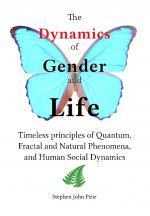[Excerpt Be and Become, © ProCreative, Sydney 2000]
In view of the ideas presented in this book, we might appreciate that we have been unduly fixated on our limited, local physical existence. But simply beginning to believe or recognize that reality is innately nonlocal will not, of itself, allow us to more freely examine the deeper aspects to our psyches.
It will not simply be a matter of believing that we are more able to access and control our subconscious and unconscious thoughts and bodily processes unless we also believe that it is safe to do so. We won’t begin to hate others less, or diminish our prejudices unless we begin to believe that it is safe to more thoroughly know ourselves. And we won’t accept that it is safe to know ourselves, and thus our fellow man until we discard some misconceptions which have had a deep influence upon mankind.
The belief in the ideal of perfection is perhaps the most pernicious by-product of the belief in “separateness” (locality). However, before I begin to explain why a belief in the ideal of perfection is so detrimental, let’s first consider just what is meant by the word “perfection.”
We begin by recognizing that a state of perfection is one that cannot be improved upon. If it could be improved it would not be perfect. Something which is perfect is ideal, complete, finished, pure, absolute, utter. Perhaps most importantly, a state of perfection is also faultless. Few religious people would consider God to have fault, or that He was somehow incomplete or unfinished. The Pope (God’s official representative here on Earth, at least according to the Roman Catholics) is also considered or believed to be infallible. In other words, He is deemed perfect. This belief in the Pope being perfect is, at the time of writing, still a central doctrine of the Catholic Church. Recently an article in a leading Sydney newspaper reported that:
"the Vatican has launched a major investigation into a well-known Australian Catholic priest who has questioned Rome’s position on the infallibility of the Pope."1
Clearly, the idea that God is perfect together with His representative is taken for granted by many religious people.
If we consider that a situation or state of being is complete and faultless and, by definition, cannot be improved then surely that means it cannot be changed. Any change could result in a better or worse, fatter or thinner, more powerful or less powerful, uglier or more beautiful state than what was previously the case.
A perfect situation or state requires that it does not change in any way whatsoever, ever. Such a state would be one of absolute stillness—unending stagnation. [As an aside perhaps this is part of the reason why many people seeking religious enlightenment seek “stillness”— because it’s supposedly a perfect state?2
Such a state, if it did exist can never be attained, for you would have to at some point in time change from an imperfect state into a perfect state of being. While quantum physics allows, indeed, requires spontaneous change to occur, to change into perfection would require that new perfect state to have changed from its previous perfect state. Doesn’t it seems rather contradictory that more than one perfect state could exist?
We know from the proof of nonlocality that everything is interconnected ... that we are each part of an “undivided whole.” It follows therefore that if perfection does actually exist somewhere within the whole then it must exist somewhere within you (the part). Some minute element of yourself must be perfect, for as in the smallest, so within the largest. As mentioned in the previous chapter, this is analogous to thinking that your hand can be imperfect, while your body is perfect (or vise versa). Clearly neither statement could be valid. If you have a imperfect hand, then you would have to have an imperfect body, for an imperfect hand would taint your body as being imperfect.
As with Christian teachings, generally speaking Eastern religions and Islamic cultures promote the idea that we are imperfect creatures, less than that characterized by a pure spiritual state. They teach that God, Allah, Jehovah or whatever name you give Him, is Pure Consciousness. Perfect, omnipotent. While the belief that God is perfect and omnipotent may appear reassuring and comforting to many, such a belief is actually the cause for much of the world’s ills. After all, the direct and unavoidable implication of not being immersed in, in touch with, or concordant with pure Consciousness is impure Consciousness. In other words, most if not all religions would have us think that as we go about our day, doing what we do, as we do it we are impure for just as surely as night follows day, if we are not Pure Consciousness, then we must be impure consciousness. The belief in perfection requires that we believe ourselves to be impure, flawed beings.
- 1. Chris McGillion, “Priest who questions Papal infallibility told: please explain,” The Sydney Morning Herald, February 7, 1998, p1.
- 2. Seeking ‘stillness’ can also be an attempt to quieten the conscious physically-orientated mind, so that one can turn inwards and contemplate the Unknowable (spiritual).
 "The Dynamics of Gender and Life" ebook is now available at
"The Dynamics of Gender and Life" ebook is now available at